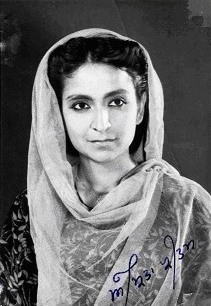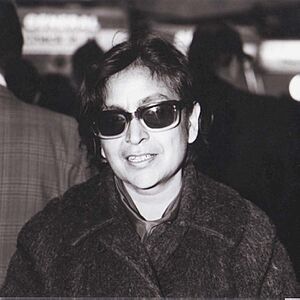Amrita Pritam facts for kids
Quick facts for kids
Amrita Pritam
|
|
|---|---|

Pritam c. 1948
|
|
| Born | Amrita Kaur 31 August 1919 Gujranwala, Punjab Province, British India (now Punjab, Pakistan) |
| Died | 31 October 2005 (aged 86) Delhi, India |
| Occupation | Novelist, poet, essayist |
| Nationality | Indian |
| Period | 1936–2005 |
| Genre | poetry, prose, autobiography |
| Subject | Partition of India, Women, Dream |
| Literary movement | Romantic-Progressivism |
| Notable works | Pinjar (novel) Ajj aakhaan Waris Shah nu (poem) Suneray (poem) |
| Notable awards | Sahitya Akademi Award (1956) Padma Shri (1969) Bharatiya Jnanpith (1982) Shatabdi Samman (2000) Padma Vibhushan (2004) |
| Spouse | Pritam Singh |
| Partner | Imroz |
| Children | 2 |
| Member of Parliament, Rajya Sabha | |
| In office 12 May 1986 – 11 May 1992 |
|
| Constituency | Nominated |
Amrita Pritam (31 August 1919 – 31 October 2005) was an Indian writer. She was a novelist, essayist, and poet. She wrote mainly in Punjabi and Hindi.
Amrita Pritam was a very important writer in Punjabi literature. She won the Sahitya Akademi Award in 1956. She wrote over 100 books. These included poetry, stories, biographies, and essays. She also collected Punjabi folk songs and wrote her own life story. Her works were translated into many languages, both in India and other countries.
She is best known for her powerful poem, Ajj aakhaan Waris Shah nu. This means "Today I invoke Waris Shah". It was a sad poem about the 18th-century Punjabi poet. It showed her deep sadness about the violence during the partition of British India.
As a novelist, her most famous book was Pinjar (meaning "The Skeleton", 1950). In this book, she created a memorable character named Puro. Puro showed the violence women faced and the loss of kindness during that time. The novel was later made into a successful film called Pinjar (2003).
When British India was divided into India and Pakistan in 1947, she moved from Lahore to India. But she remained popular in Pakistan throughout her life.
Her long poem Sunehade won her the 1956 Sahitya Akademi Award. This made her the first woman to receive this award for a Punjabi work. In 1982, she received the Jnanpith Award. This is one of India's highest literary awards. She got it for her book Kagaz Te Canvas ("The Paper and the Canvas"). She also received the Padma Shri in 1969 and the Padma Vibhushan in 2004. The Padma Vibhushan is India's second highest award for civilians. In 2004, she also received the Sahitya Akademi Fellowship. This is India's highest literary honor, given to "immortals of literature" for their lifetime achievements.
| Top - 0-9 A B C D E F G H I J K L M N O P Q R S T U V W X Y Z |
About Amrita Pritam
Early Life and Writing
Amrita Pritam was born as Amrit Kaur in 1919. This was in a part of Punjab that is now in Pakistan. Her family was Khatri Sikh. She was the only child of Raj Bibi, a school teacher, and Kartar Singh Hitkari. Her father was a poet and a scholar. He also edited a literary magazine and was a preacher of the Sikh faith.
Amrita's mother passed away when Amrita was eleven years old. Soon after, she and her father moved to Lahore. She lived there until she moved to India in 1947. After her mother's death, she felt very lonely. She started writing at a young age to express herself.
Her first collection of poems, Amrit Lehran ("Immortal Waves"), was published in 1936. She was sixteen years old then. In the same year, she married Pritam Singh. He was an editor whom she had been engaged to since childhood. After marriage, she changed her name from Amrit Kaur to Amrita Pritam. She published several more poetry collections between 1936 and 1943.
Becoming a Progressive Writer
Amrita Pritam started as a romantic poet. But she soon changed her style. She joined the Progressive Writers' Movement. This group of writers wanted to use their writing to bring about social change. Her collection Lok Peed ("People's Anguish", 1944) showed this change. It openly criticized the difficult economic times after the Bengal famine of 1943.
She also did some social work. After India became independent, she helped with social activities. She contributed to the first Janta Library in Delhi. This library and study center is still open today. Before the partition of India, she also worked at a radio station in Lahore.
The Partition of India
In 1947, British India was divided into India and Pakistan. This event led to a lot of violence. About one million people died. Amrita Pritam became a refugee at age 28. She left Lahore and moved to New Delhi.
In 1947, while she was expecting her son, she wrote the poem "Ajj Aakhaan Waris Shah Nu". She wrote it while traveling from Dehradun to Delhi. This poem showed her deep sorrow about the horrors of the Partition. It became a very famous and important poem. The poem was addressed to the Sufi poet Waris Shah. She felt a connection to him because they shared the same birthplace.
Later Works and Themes
Amrita Pritam worked for All India Radio in Delhi until 1961. After her divorce in 1960, her writing often focused on women's experiences. Many of her stories and poems were inspired by her difficult marriage.
Many of her works have been translated into other languages. These include English, French, Japanese, and Chinese. Her autobiographies, Black Rose and Rasidi Ticket (Revenue Stamp), were also translated.
Her novel Pinjar (The Skeleton, 1950) tells the story of the Partition riots. It also shows the struggles of women during that time. The novel was made into an award-winning Hindi movie in 2003. The director, Chandra Prakash Dwivedi, said he chose the story because it showed the human suffering of people from both countries.
For many years, she edited Nagmani. This was a monthly literary magazine in Punjabi. She ran it with Imroz for 33 years. After the Partition, she also wrote a lot in Hindi. Later in her life, she became interested in the spiritual teachings of Osho. She wrote introductions for some of Osho's books. She also started writing about spiritual topics and dreams. Some of these works include Kaal Chetna ("Time Consciousness") and Agyat Ka Nimantran ("Call of the Unknown"). She also published other autobiographies like Kala Gulab ("Black Rose", 1968) and Aksharon kay Saayee ("Shadows of Words").
Awards and Recognition
Amrita Pritam received many awards and honors during her lifetime. She was the first person to receive the Punjab Rattan Award. This award was given to her by the Chief Minister of Punjab.
She was the first woman to win the Sahitya Akademi Award in 1956 for her poetry collection Sunehadey (meaning "Messages"). In 1982, she received the Bhartiya Jnanpith Award. This is India's highest literary award. She got it for her book Kagaj te Canvas (Paper and Canvas).
She also received the Padma Shri in 1969 and the Padma Vibhushan in 2004. The Padma Vibhushan is India's second highest civilian award. In 2004, she also received the Sahitya Akademi Fellowship. This is India's highest literary honor.
Many universities gave her honorary degrees. These included Delhi University (1973), Jabalpur University (1973), and Vishwa Bharati (1987).
She also received international awards. These included the Vaptsarov Award from Bulgaria (1979). She also received the Degree of Officer dens, Ordre des Arts et des Lettres from the French Government (1987). She was a nominated member of the Rajya Sabha (Indian Parliament) from 1986 to 1992.
Towards the end of her life, Pakistan's Punjabi Academy honored her. She said, Bade dino baad mere Maike ko meri Yaad aayi.. (My motherland has remembered me after a long time). Punjabi poets from Pakistan also sent her a chaddar (a cloth covering) from the tombs of famous Sufi poets like Waris Shah, Bulle Shah, and Sultan Bahu.
Personal Life
In 1935, Amrita married Pritam Singh. They had two children, a son and a daughter. Later, she found a close companion in the artist and writer Inderjeet Imroz. She spent the last forty years of her life with Imroz. He designed many of her book covers and painted her often. Their life together is described in a book called Amrita Imroz: A Love Story.
Amrita Pritam passed away peacefully in her sleep on 31 October 2005. She was 86 years old and had been ill for a long time. She is remembered by her partner Imroz, her daughter Kandlla, her son Navraj Kwatra, her daughter-in-law Alka, and her grandchildren.
Legacy
In 2007, an audio album was released called 'Amrita recited by Gulzar'. In this album, the famous lyricist Gulzar recited poems by Amrita Pritam. A film about her life is also being made.
On 31 August 2019, Google honored her 100th birthday with a special Doodle. The message with the Doodle said that Amrita Pritam was one of the most important female Punjabi writers. It noted that she "dared to live the life she imagines." It also mentioned that she published her first poetry collection at age 16.
See also
- Indian Writers
- Indian Poets


